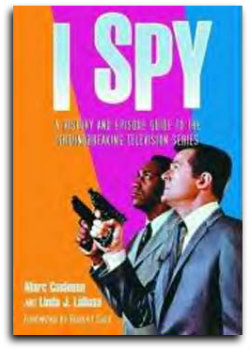
HOMEWesley Britton’s Books,
|
Spies on FilmSpies on Television & RadioSpies in History & LiteratureThe James Bond Files |
|
Spies on Television & Radio ~ The I Spy Movie
That Never Was
By Marc Cushman and Linda J. LaRosa Introductory Notes by Wesley Britton ~  In November 2002, absolutely no one was pleased with a feature film called I Spy, yet another Hollywood attempt to capitalize on the name of a venerable TV series with minimal connections to the inspiration. No one involved with the 1965-1968 hit show had any input into this turkey, and trade reports claimed producer Betty Thomas just didn’t want to be bothered with any dealings with stars Robert Culp and Bill Cosby. In 1994, things had been different. That year, producer Sheldon Leonard finally got a TV movie bankrolled, hoping to see his favorite project come back as a new series. Kelly Robinson (Robert Culp) and Alexander Scott (Bill Cosby) starred anew in I Spy Returns, but they weren’t interested in launching a new franchise. In fact, they collaborated on an ending to the story quite different from the script making certain this wouldn’t happen, much to the distress of Leonard. In between these productions, one of many “might have been” projects percolated in the Hollywood pipeline. In 1989, Culp and Cosby tried to make a feature film of I Spy on their own terms – but it didn’t happen. Below is the story of this never-produced film as described in Marc Cushman and Linda J. LaRosa’s 2007 I Spy: A History and Episode Guide to the Groundbreaking Television Series (Jefferson, NC: McFarland and Co.). This excerpt is published with the permission of Marc. (For more about this book, check out “Uncovering I Spy – An Interview with Marc Cushman, Author of the First Full-length History of a Classic Series” posted in the Spies on Television & Radio section of this website.) [By 1989] Warner Brothers had acquired the rights for I Spy from Sheldon Leonard, who was now shut out by an industry he once dominated. Leonard relented and accepted an option offer on the title and concept of the series he had brought into the world. Warner Brothers wanted to bring it back as a feature film, but they didn’t want him. It was all about Cosby. The studio was certain that their idea for a Cosby feature film would far surpass the other two studios' projects. And Cosby was interested, with one condition: “If Warner Brothers want Culp and Cosby, they can have Culp and Cosby, but only if Culp directs and edits.” That was the response Cosby gave, the words Culp vividly remembers reading in a trade magazine by Hollywood columnist Army Archerd. It was the first he had heard of it. Culp: “They didn’t want Culp, they wanted Cosby. But, when he made that statement to the press, he put my name first.” Cosby made sure Warner Brothers understood, when it came to I Spy, it wasn’t just about Cosby. It was Culp and Cosby, in that order, just as it had always been. By stating that Culp would also edit, Cosby was telling Warner Brothers that Culp was going to have final cut, a commodity studios are very reluctant to give away to any director, especially a director not on their “A” list. The idea of having Bill Cosby in 1989, at the peak of his television comeback, in a big screen version of the series that started it all for him, was too tempting for Warner Brothers to resist. They agreed to Cosby’s terms. Robert Culp would costar in the movie with Cosby. He would direct and he would also write the screenplay. Culp: “I dealt with two guys, Mark Canton and a guy who worked for him, Bill Gerber. Gerber was smart as hell. We never had a dispute, not on material, not on anything. I sold them my pitch on what to do with I Spy. To keep Cosby, Canton’s job was to smile as white as he could and say ‘Yeah.’ And he did.” So Culp went to work. His script, simply titled “I Spy” involved the reactivation of former agent Alexander Scott. Kelly is in trouble. He appears to be involved in covert operations for the other side. An order to terminate him may be put out if Scott isn’t able to make contact and clear his former partner’s name. Scott, now a college professor, has been away from the spy game for 20 years. Moreover, he hasn’t had contact with Kelly for nearly as long. The two men, who once appeared inseparable, did separate, but not under good terms. Kelly didn’t appreciate Scott’s desire to leave the service and end their partnership. And, as we all know, Kelly does not take rejection well. Scott, not able to turn his back on his friend, resumes his espionage duties, finding his former partner and traveling with him to India in search of the answers that will expose the true traitor. Along the way, we meet one other familiar face, Jimmy, their helpful, double-dealing supplier from Hong Kong. Jimmy, who was played by Japanese actor Mako, was first seen in the Culp written episode, “The Loser.” Friedkin and Fine placed Jimmy in a second episode, “No Exchange on Damaged Merchandise.” The antagonist in the story, the man behind the attempt to frame Kelly, is Cochran, a former company man who oversaw the training of Kelly and Scott. While not as strong as some of Culp’s other works for I Spy, the script is nonetheless an effective reteaming of Kelly and Scott, and would have pleased many fans from the original series. But it did not please Warner Brothers. Culp admits that he struggled with the script. Culp: “I was trying to write this thing the same way I had written the best of my I Spys, by the seat of my pants. Well, this is not a one-hour episode, where, if you’ve got one good scene, you got it. This is a feature film. The rules are different.” As Culp was attempting to find his way through the script, the time allotted for writing the first draft had ended. A deadline is a word with an appropriate name and meaning. Miss it, and your career may very well be dead. Culp turned in his first draft. Culp: “I handed in something that wasn’t ready.” Believing it would take the studio time to tear apart the script, Culp flew to India to hook up with his son, Josh, who had been scouting locations. Culp: “No sooner do I arrive there and Gerber calls to say, ‘We’ve read the material and probably the best thing to do is to get on a plane and come home.’ I asked him if he was ordering me to come back. He said ‘no, it wasn’t an order,’ then he repeated that ‘it would just be best’ for me to do as he suggested.” Culp knew what this meant. As a writer, he had failed to please Warner Brothers. The tone of Gerber’s voice on the phone made that very clear. He was being called in on the carpet, and it would be a long journey home. Culp: “So I got on a plane and came home. God, it was awful. “It took me forever to finally solve the problem with the script. And, during all this, along comes the longest writers strike in the history of the business – eight months! It was a horrible hardship on everybody.” The Warner heads who had given the project a green light were now having second thoughts. Leonard Part 6, the first movie to put Bill Cosby in a lead in nearly 20 years, had been released, and it was not being well received by the critics, or the public, or even by Cosby himself. The story, like the intended I Spy movie, had Cosby playing a former spy who comes out of retirement, this time to take on a rogue group that is knocking off the government’s top-secret agents. According to film critic Leonard Maltin, “Even Cosby, who received story and producer credits with the film, warned audiences to stay away from this megabomb.” Tri-Star lost a bundle. Warner Brothers was worried. When the writers strike finally ended, Culp was asked to bring in another writer to help him with the script. Culp: “They left it up to me. I interviewed other writers, hired one, and then went to work on another version. The other guy would fail, then another would be hired, and he would fail. This went on for almost a year. It was all my fault. I couldn’t solve the problems, and I couldn’t get anybody to tell me the one thing I needed to know – to keep it cheap. If anybody had said that, I would have said, ‘Oh, you mean like the TV series.’ And I would have found a way to do it. “I had a vision of enormous grandeur. I had a good enough story; some good scenes, maybe not great, but good solid stuff. And I had fascinating visuals. But I don’t think that anyone at Warner Brothers ever read that final script. Everything was blocked. Nothing was going to happen. And I realized that this picture wasn’t going to get made.” As the Warner Brothers deal unraveled, Culp was carrying a great weight. It was his script, his budget, his vision, and it had taken longer than originally expected. He had let his friend and partner down. But Bill Cosby stepped in to share the blame. Culp: “Bill said to me, after it was all over and done with, ‘It wasn‘t you. It wasn‘t your fault. It was my fault, because of those two pictures. They don’t want to talk to either one of us anymore.” The second picture Cosby referred to was Ghost Dad, the movie he was shooting as Culp was laboring on the I Spy script. Culp: “Ghost Dad comes out and it tanks in exactly the same manner [as] Leonard Part 6 did. Seriously tanks. Death, on the first weekend.” That was Universal’s problem. Warner Brothers made their decision. The I Spy movie was off. Copyright © 2007 by Marc Cushman An interview with Marc Cushman, “Uncovering I Spy”, can be found on this website in the Spies on Television & Radio section. I Spy: A History and Episode Guide to the Groundbreaking Television Series, by Marc Cushman and Linda J. LaRosa, is available in bookstores everywhere, as well as these on-line merchants ~
McFarland & Company, Inc.
|